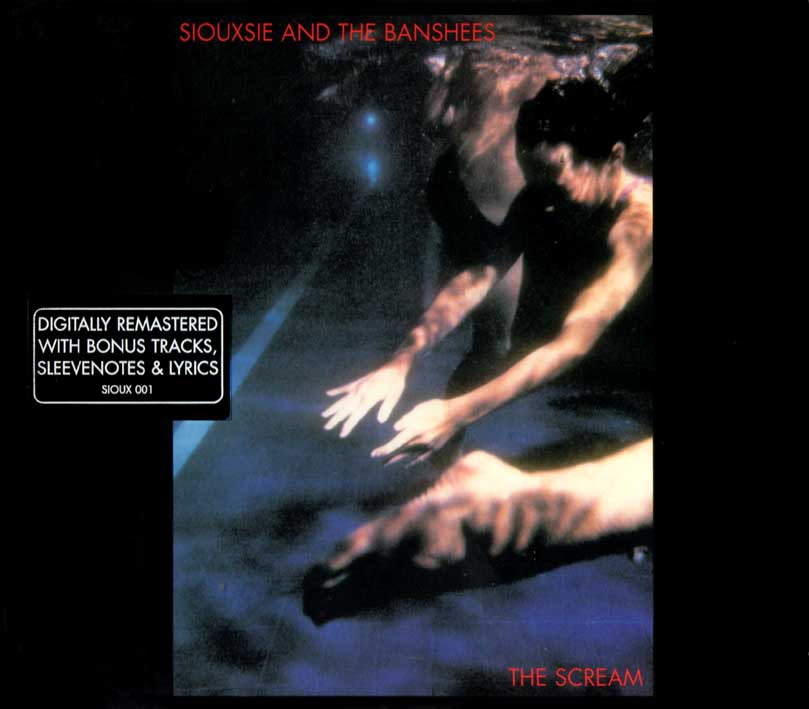
Cat: 983 691-1
Click on cover for full scan
Liner notes courtesy of Simon Goddard
Steve Lillywhite
Mike Stavrou
| THE
SCREAM
Includes scans of LPs, cassettes, CDs, promos, imports, limited editions and adverts. Also includes track listings, catalogue numbers, release dates, chart positions, credits, liner notes and reviews. |
|
|
| LINER NOTES | ||
|
|
||
|
|
||
|
It had been several
months since anyone had clapped eyes on Neddy Merrill. Nobody really
expected to see him again, let alone for him to suddenly reappear one day
at a neighbour's poolside, naked except for swimming trunks.
Likewise, few could have anticipated Neddy's insane proposal; that he
intended to "swim home" through the necklace of open air pools
dotted across the affluent middle-class suburban valley that until
recently, had been his locale.
And so Neddy began his odyssey. Over garden fence, from pool to pool, stamina slowly sapping away with each chlorine-purified plunge, the reality of his disturbed mental state irrepressibly exposed to all who encountered him along the way. Come the last hurdle - a community pool swarming with children whose ecstatic shrieks deafened his frayed senses - he finally reached breaking point. Close to drowning, his body shattered, his mind teetering on the brink of meltdown, his spirit drunk on the euphoria of having nearly completed his epic quest, all Neddy Merril could think to do was... scream noun 1 a loud and shrill cry or noise. 2 as in the scream; the most famous work by Norwegian expressionist painter Edvard Munch. 3 as in the scream; the debut album by Siouxsie And The Banshees which has nothing to do with a painting by Edvard Munch and everything to do with a 1968 film entitled the swimmer starring Burt Lancaster in the role of Neddy Merrill. Think of it as a scream of exhausted jubilance after a troubled, arduous journey. For Neddy Merrill, the agonising climax of one day swimming to destiny. For The Banshees, a celebratory roar marking the culmination of over two years gob-drenched hard graft which began on stage at London's 100 Club on September 20, 1976: the first night of a two day Punk Festival where 'Suzie & The Banshees' were bottom of the bill. Not so much a band as an idea, this first Banshees prototype was little more than a violent tempest of social disaffection looking for a focus. At the eye of the storm stood their 19 year-old singer Siouxsie Sioux (born Susan Ballion); a refugee from the suburbs of Chislehurst in Kent, raised on Bowie and Bolan, rescued by the surly libertinism punk rock readily advocated. Beside her, 20 year-old bassist and partner-in-crime Steven Severin (born Steven Bailey); a kindred glam spirit from Bromley who owed his nom-de-plume to a line from The Velvet Underground's 'Venus In Furs', just as Siouxsie owed hers to the Native American Indian tribe. Together, Sioux and Severin persuaded nefarious rock 'n' roll swindler Malcolm McLaren into letting them share the 100 Club bill with the Sex Pistols, The Clash and France's Stinky Toys. They'd gotten the gig: now all they needed was an actual band to play it. With just three days notice, future Adam Ant sideman Marco Pirroni (guitar) along with future Pistol and punk martyr Sid Vicious (drums) were hastily press-ganged into allegiance. 'Cry Of The Banshee', a low rent Hammer-style yarn about witchcraft in Elizabethan England starring Vincent Price, provided inspiration for the hitherto elusive group name. As for actual 'songs', after toying with the theme tune to 'Captain Scarlet' (a later live favourite) or a calculated desecration of The Beatles' 'She Love You', they settled on a 20 minute improvised dirge based around 'The Lord's Prayer', stirred up with snatches of 'Deutschland, Deutschland Uber Alles' and 'Twist And Shout'. Irreverent, chaotic and uncompromising, it was the perfect overture to The Banshee's live career. By the Silver Jubilee summer of 1977 - and following Sioux and Severin's place in television history amidst the Pistols entourage on the notorious Bill Grundy interview in December '76 - a more coherent realization of The Banshees had finally taken shape. On drums, Kenny Morris; an awestruck attendee of their 100 Club debut. On guitar, John McKay. The band's sound would be shaped by Siouxsie's obsession with horror in all its genres - from Edgar Allen Poe and Herbert Van Thal's yearly 'Pan Book Of Horror Stories' to the soundtracks from 'Psycho' and 'The Omen' which she played Morris and McKay as a musical pointer. "I wanted to do something that thrilled me the way that films that had an edge did," she explains. "A slight disturbance. It makes you think, it makes you aware, it makes you know you're alive. Getting away from opium, the state of nullifying and numbing things, I love it when the senses are tingling. It's what I like, it's what attracts me." McKay responded to Siouxsie's brief with the clattering disharmony of 'Suburban Relapse' and the foreboding death marches of 'Metal Postcard' and 'Overground', his abrasive chord shapes gelling perfectly with the primordial rhythm section of Severin and Morris. Still punk rock, but with it's own avant-garde 'X' certificate score. No longer an idea, Siouxsie And The Banshees had finally become a band. Better still, a band of ideas. BBC producer John Walters certainly thought as much when her overheard them soundcheck at The Greyhound in Croydon on a double bill with The Slits in early October. "They were actually working as a band," Walters later commented "you could see there were certain musical patterns and they had plans. I booked them." The ensuing BBC session for John Peel broadcast the first week of December, coincided with music weekly 'Sounds'' iconic front page portrait of Siouxsie brandishing a microphone at arms' length in a t-shirt teasingly illustrated with a pair of breasts. Caption: 'The Ice Queen'. A second Peel session, including a debut airing for the exhilarating 'Hong Kong Garden', followed barely tow moths later in February '78. Yet while Peel and 'Sounds' were quick to recognise The Banshees' potential, the major labels of the day were either ignorant or, in the case of EMI who expressed an interest on the proviso that they could "control the lyrics", plain terrified of The Ice Queen and her attendant cacophonic courtiers. Obsessed roadie Les Mills (later to become manager of The Psychedelic Furs) soon took matters into his own hands by defacing the exterior walls of central London record company offices with 'SIGN THE BANSHEES' graffiti. Before long, Polydor were finally jolted to attention, though not so much by Mills' handiwork as received wisdom that the group planned to release the Peel version of 'Hong Kong Garden' as a single through BBC Records. According to John Walters, "We thought that'd be enough to get them on the fringes of the chart, and that would pull the finger out of the dyke, as it were, and the offers would come flooding in." In the event, on June 9, 1978, Polydor got to The Banshees before the BBC could ink any deal. 'Hong Kong Garden' would remain their debut single, albeit a pristine re-recording that highlighted its infectious oriental hookline. Named after her local Chinese takeaway back in Chislehurst, Siouxsie's lyrics were a belated venting of teenage frustration at witnessing right-wing skinheads torment its staff yet being unable to defend or retaliate on their behalf. "I felt so helpless," she says. "I wanted to tell them we're not like them, we don't think like that. It's also kind of about East meeting West, or rather East being polluted by West. I've always had a fascination with the Far East anyway. Two very different cultures. I find the purity of it very attractive, but there's an element of sadness when I see the two meeting, that Eastern nobility being dragged down to the level of Disney." In spite of such sombre lyrical intent, 'Hong Kong Garden' was an irresistible punk-pop hit (climbing to No 7 in the UK that September) if an otherwise uncharacteristic taste of things to come: 'The Scream' itself, released in November. The first notable credit by fledgling (co)producer Steve Lillywhite, 'The Scream' was The Banshees laid bare in all their uncensored, vitriolic grandeur. Its ten tracks cherry-picked the strongest offerings from their previous fifteen months consolidating their specific Velvet Underground-meets-'Psycho' musical dynamic (or as the NME's Nick Kent put it, "The Velvet Underground matched with much of the ingenuity of 'Tago Mago'-era Can"). These included: 'Mirage', the album's only obvious chart contender, which addressed what some critics misconstrued as the superficiality of the group's image; the dissonant 'Stepford Wife' breakdown of 'Suburban Relapse'; the barbed paean to non-conformity that was 'Overground' which, according to Severin, related to the conundrum The Banshees faced when pursuing a major record deal; the expletive-spiked reinterpretation of Lennon/McCartney's 'Helter Skelter' - the song that controversially 'inspired' the Manson Family killings yet here performed as Manson may have head it in the recesses of his unhinged psyche; and the extraordinary Teutonic shudder of 'Metal Postcard'. Arguably the album's focal track, 'Metal Postcard' would assume special significance for Siouxsie at a time when she was still being rapped on the knuckles by some journalists for having spent the summer of '76 wearing a swastika armband purely to shock. 'Metal Postcard' was were the Siouxsie of '78 coolly rebuffed any lingering doubts about her political leanings with an austere, intelligent tribute to the work of anti-Nazi propaganda artist John Heartfield. Born Helmut Herzfield in 1891, he later anglicised his name in 1915 as a protest against German nationalism. Siouxsie's lyrics concerned themselves with one of Heartfield's most celebrated collages, 'Hurrah, Die Butter Is Alle' ('Hurrah, All The Butter Is Gone') showing a Nazi family sat around a dinner table feasting on axe-heads and bicycle handlebars - a pointed satire on Goering's crass propagandizing that "Iron has always made our country strong. Butter and lard only make people fat." As 'Mittageisen', it would later be re-recorded in German and released as The Banshees' fourth single in September 1979, backed with live favourite 'Love In A Void'. Elsewhere, 'Jigsaw Feeling' and the saxophone squealing finale 'Switch' touched upon issues of fractured personalities and alternate lives colliding, thereby anticipating The Banshees Mk II and the likes of 1980's 'Christine' and 'Eve White/Eve Black', both inspired by real-life schizophrenic Christine Sizemore, subject of 'The Three Faces Of Eve'. Which left only 'Nicotine Stain', an urgent fuzzbox rush wallowing in an ashtray of catarrh and self-loathing, and the opening exorcism of primal Banshee waling, 'Pure'. The album's sleeve and inner artwork further acknowledge the film that had inspired its title (even though it didn't share it). Yet in doing so, The Banshees risked tempting fate. In the final frames of 'The Swimmer', when Neddy reaches his 'home', he finds it locked and abandoned, his wife and children long gone. Merrill's journey's end is one of tragedy and despair, and for a while, it really did look as if in the aftermath of their exceptional debut LP, The Banshees' trajectory was to reach a similarly bleak conclusion. Second single, March '79's eerie murder-waltz 'The Staircase (Mystery), only made it as far as No 24 (its promotional video maintaining the 'Psycho' motif by imitating Hitchcock's famous scene where Norman Bates sends Detective Arbogast tumbling to his death). Rushed into making a follow-up album within the year, the resulting 'Join Hands' proved to be a decidedly problematic sequel. But that really is another story. Even though within a few years The Banshees would become, in Siouxsie's own words, "almost a different band", 'The Scream' would cast an indelibly prophetic shadow upon their future; from 1983's cover of 'Dear Prudence' (plucked from the same Beatles album as 'Helter Skelter', 'The White Album'), to the following year's dramatic orchestral reworking of 'Overground' (1984's 'The Thorn' EP). Coming full circle, when embarking on 2002's one-off 'Seven Year Itch' reunion tour, it was The Scream's opening brace of 'Pure and 'Jigsaw Feeling' which began every performance. More than merely one of the great debuts of the post-punk era, in its abyss of angst and angularity, The Banshees' introductory howl still exudes a pitch black allure, a captivating claustrophobia that, to this day, had yet to be equalled. Already, history has proven 'The Scream' incapable of being silenced. Long may it continue to pierce the senses. Simon Goddard 2006. |
||
| PRESS | ||
|
|
||
|
|
||
| Mojo 06/06 | ||
|
|
||
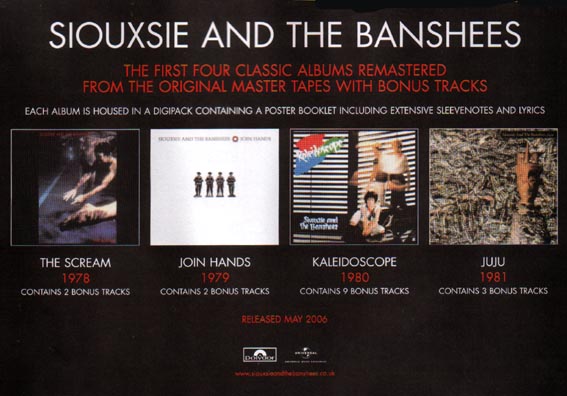
|
||
| LINER NOTES | ||
|
|
||
|
|
||
|
It had been several
months since anyone had clapped eyes on Neddy Merrill. Nobody really
expected to see him again, let alone for him to suddenly reappear one day
at a neighbour's poolside, naked except for swimming trunks.
Likewise, few could have anticipated Neddy's insane proposal; that he
intended to "swim home" through the necklace of open air pools
dotted across the affluent middle-class suburban valley that until
recently, had been his locale.
And so Neddy began his odyssey. Over garden fence, from pool to pool, stamina slowly sapping away with each chlorine-purified plunge, the reality of his disturbed mental state irrepressibly exposed to all who encountered him along the way. Come the last hurdle - a community pool swarming with children whose ecstatic shrieks deafened his frayed senses - he finally reached breaking point. Close to drowning, his body shattered, his mind teetering on the brink of meltdown, his spirit drunk on the euphoria of having nearly completed his epic quest, all Neddy Merril could think to do was... scream noun 1 a loud and shrill cry or noise. 2 as in the scream; the most famous work by Norwegian expressionist painter Edvard Munch. 3 as in the scream; the debut album by Siouxsie And The Banshees which has nothing to do with a painting by Edvard Munch and everything to do with a 1968 film entitled the swimmer starring Burt Lancaster in the role of Neddy Merrill. Think of it as a scream of exhausted jubilance after a troubled, arduous journey. For Neddy Merrill, the agonising climax of one day swimming to destiny. For The Banshees, a celebratory roar marking the culmination of over two years gob-drenched hard graft which began on stage at London's 100 Club on September 20, 1976: the first night of a two day Punk Festival where 'Suzie & The Banshees' were bottom of the bill. Not so much a band as an idea, this first Banshees prototype was little more than a violent tempest of social disaffection looking for a focus. At the eye of the storm stood their 19 year-old singer Siouxsie Sioux (born Susan Ballion); a refugee from the suburbs of Chislehurst in Kent, raised on Bowie and Bolan, rescued by the surly libertinism punk rock readily advocated. Beside her, 20 year-old bassist and partner-in-crime Steven Severin (born Steven Bailey); a kindred glam spirit from Bromley who owed his nom-de-plume to a line from The Velvet Underground's 'Venus In Furs', just as Siouxsie owed hers to the Native American Indian tribe. Together, Sioux and Severin persuaded nefarious rock 'n' roll swindler Malcolm McLaren into letting them share the 100 Club bill with the Sex Pistols, The Clash and France's Stinky Toys. They'd gotten the gig: now all they needed was an actual band to play it. With just three days notice, future Adam Ant sideman Marco Pirroni (guitar) along with future Pistol and punk martyr Sid Vicious (drums) were hastily press-ganged into allegiance. 'Cry Of The Banshee', a low rent Hammer-style yarn about witchcraft in Elizabethan England starring Vincent Price, provided inspiration for the hitherto elusive group name. As for actual 'songs', after toying with the theme tune to 'Captain Scarlet' (a later live favourite) or a calculated desecration of The Beatles' 'She Love You', they settled on a 20 minute improvised dirge based around 'The Lord's Prayer', stirred up with snatches of 'Deutschland, Deutschland Uber Alles' and 'Twist And Shout'. Irreverent, chaotic and uncompromising, it was the perfect overture to The Banshee's live career. Five months on - and following Sioux and Severin's place in television history amidst the Pistols entourage on the notorious Bill Grundy interview in December '76 - a more coherent realization of The Banshees supported Johnny Thunders & The Heartbreakers in Croydon on February 24, 1977. On drums, Kenny Morris; an awestruck attendee of their 100 Club debut. On guitar, Pete Fenton. Their set now boasted the first tentative batch of Banshees originals. Though never properly recorded for posterity, they bore short, sharp titles like 'Scrapheap', 'Psychic' and 'Bad Shape', the latter exemplifying a morbid fascination with physical dysfunction and bodily disgust central to the early Banshees repertoire (ditto 'Carcass'). By the Silver Jubilee of '77, Fenton would be replaced on guitar by John McKay, but not before taking part in a demo at Riverside Studios. The session would include 'Make Up To Break Up'; a macabre critique on cosmetics which inverted the title of an old Stylistics hit (1973's 'Break Up To Make Up') while name-checking another budget exploitation movie, 'The Devil's Rain' starring William Shatner, Ida Lupino and the founder of the Church Of Satan, Anton La Vey. It seemed horror in all its genres still exerted a considerable influence upon The Banshees' art, be it in the writings of Edgar Allen Poe and Herbert Van Thal's yearly 'Pan Book Of Horror Stories' to the soundtracks from 'Psycho' and 'The Omen' which she played Morris and McKay as a musical pointer. "I wanted to do something that thrilled me the way that films that had an edge did," she explains. "A slight disturbance. It makes you think, it makes you aware, it makes you know you're alive. Getting away from opium, the state of nullifying and numbing things, I love it when the senses are tingling. It's what I like, it's what attracts me." McKay responded to Siouxsie's brief with the clattering disharmony of 'Suburban Relapse' and the foreboding death marches of 'Metal Postcard' and 'Overground', his abrasive chord shapes gelling perfectly with the primordial rhythm section of Severin and Morris. Still punk rock, but with it's own avant-garde 'X' certificate score. No longer an idea, Siouxsie And The Banshees had finally become a band. Better still, a band of ideas. BBC producer John Walters certainly thought as much when her overheard them soundcheck at The Greyhound in Croydon on a double bill with The Slits in early October. "They were actually working as a band," Walters later commented "you could see there were certain musical patterns and they had plans. I booked them." The ensuing BBC session for John Peel broadcast the first week of December, coincided with music weekly 'Sounds'' iconic front page portrait of Siouxsie brandishing a microphone at arms' length in a t-shirt teasingly illustrated with a pair of breasts. Caption: 'The Ice Queen'. A second Peel session, including a debut airing for the exhilarating 'Hong Kong Garden', followed barely tow moths later in February '78. Yet while Peel and 'Sounds' were quick to recognise The Banshees' potential, the major labels of the day were either ignorant or, in the case of EMI who expressed an interest on the proviso that they could "control the lyrics", plain terrified of The Ice Queen and her attendant cacophonic courtiers. Obsessed roadie Les Mills (later to become manager of The Psychedelic Furs) soon took matters into his own hands by defacing the exterior walls of central London record company offices with 'SIGN THE BANSHEES' graffiti. Before long, Polydor were finally jolted to attention, though not so much by Mills' handiwork as received wisdom that the group planned to release the Peel version of 'Hong Kong Garden' as a single through BBC Records. According to John Walters, "We thought that'd be enough to get them on the fringes of the chart, and that would pull the finger out of the dyke, as it were, and the offers would come flooding in." In the event, on June 9, 1978, Polydor got to The Banshees before the BBC could ink any deal. 'Hong Kong Garden' would remain their debut single, albeit a pristine re-recording that highlighted its infectious oriental hookline. Named after her local Chinese takeaway back in Chislehurst, Siouxsie's lyrics were a belated venting of teenage frustration at witnessing right-wing skinheads torment its staff yet being unable to defend or retaliate on their behalf. "I felt so helpless," she says. "I wanted to tell them we're not like them, we don't think like that. It's also kind of about East meeting West, or rather East being polluted by West. I've always had a fascination with the Far East anyway. Two very different cultures. I find the purity of it very attractive, but there's an element of sadness when I see the two meeting, that Eastern nobility being dragged down to the level of Disney." In spite of such sombre lyrical intent, 'Hong Kong Garden' was an irresistible punk-pop hit (climbing to No 7 in the UK that September) if an otherwise uncharacteristic taste of things to come. Only on its B-side, the Baudelaire-influenced groan of 'Voices', did their inaugural 45 hint at the Banshees' inner heart of darkness, one that wouldn't be properly unveiled until November '78 with 'The Scream' itself. The first notable credit by fledgling (co)producer Steve Lillywhite, 'The Scream' was The Banshees laid bare in all their uncensored, vitriolic grandeur. Its ten tracks cherry-picked the strongest offerings from their previous fifteen months consolidating their specific Velvet Underground-meets-'Psycho' musical dynamic (or as the NME's Nick Kent put it, "The Velvet Underground matched with much of the ingenuity of 'Tago Mago'-era Can"). Of the pre-McKay period, only the bloody butcher metaphor of 'Carcass' would make it to the final running order. As for the remaining nine tracks, over half had been previewed during those decisive Peel sessions: 'Mirage', the album's only obvious chart contender, which addressed what some critics misconstrued as the superficiality of the group's image; the dissonant 'Stepford Wife' breakdown of 'Suburban Relapse'; the barbed paean to non-conformity that was 'Overground' which, according to Severin, related to the conundrum The Banshees faced when pursuing a major record deal; the expletive-spiked reinterpretation of Lennon/McCartney's 'Helter Skelter' - the song that controversially 'inspired' the Manson Family killings yet here performed as Manson may have head it in the recesses of his unhinged psyche; and the extraordinary Teutonic shudder of 'Metal Postcard'. Arguably the album's focal track, 'Metal Postcard' would assume special significance for Siouxsie at a time when she was still being rapped on the knuckles by some journalists for having spent the summer of '76 wearing a swastika armband purely to shock. 'Metal Postcard' was were the Siouxsie of '78 coolly rebuffed any lingering doubts about her political leanings with an austere, intelligent tribute to the work of anti-Nazi propaganda artist John Heartfield. Born Helmut Herzfield in 1891, he later anglicised his name in 1915 as a protest against German nationalism. Siouxsie's lyrics concerned themselves with one of Heartfield's most celebrated collages, 'Hurrah, Die Butter Is Alle' ('Hurrah, All The Butter Is Gone') showing a Nazi family sat around a dinner table feasting on axe-heads and bicycle handlebars - a pointed satire on Goering's crass propagandizing that "Iron has always made our country strong. Butter and lard only make people fat." As 'Mittageisen', it would later be re-recorded in German and released as The Banshees' fourth single in September 1979, backed with live favourite 'Love In A Void'. Elsewhere, 'Jigsaw Feeling' and the saxophone squealing finale 'Switch' touched upon issues of fractured personalities and alternate lives colliding, thereby anticipating The Banshees Mk II and the likes of 1980's 'Christine' and 'Eve White/Eve Black', both inspired by real-life schizophrenic Christine Sizemore, subject of 'The Three Faces Of Eve'. Which left only 'Nicotine Stain', an urgent fuzzbox rush wallowing in an ashtray of catarrh and self-loathing, and the opening exorcism of primal Banshee waling, 'Pure'. The album's sleeve and inner artwork further acknowledge the film that had inspired its title (even though it didn't share it). Yet in doing so, The Banshees risked tempting fate. In the final frames of 'The Swimmer', when Neddy reaches his 'home', he finds it locked and abandoned, his wife and children long gone. Merrill's journey's end is one of tragedy and despair, and for a while, it really did look as if in the aftermath of their exceptional debut LP, The Banshees' trajectory was to reach a similarly bleak conclusion. Second single, March '79's eerie murder-waltz 'The Staircase (Mystery), only made it as far as No 24 (its promotional video maintaining the 'Psycho' motif by imitating Hitchcock's famous scene where Norman Bates sends Detective Arbogast tumbling to his death). Rushed into making a follow-up album within the year, the resulting 'Join Hands' proved to be a decidedly problematic sequel. But that really is another story. Even though within a few years The Banshees would become, in Siouxsie's own words, "almost a different band", 'The Scream' would cast an indelibly prophetic shadow upon their future; from 1983's cover of 'Dear Prudence' (plucked from the same Beatles album as 'Helter Skelter', 'The White Album'), to the following year's dramatic orchestral reworking of 'Overground' (1984's 'The Thorn' EP). Coming full circle, when embarking on 2002's one-off 'Seven Year Itch' reunion tour, it was The Scream's opening brace of 'Pure and 'Jigsaw Feeling' which began every performance. More than merely one of the great debuts of the post-punk era, in its abyss of angst and angularity, The Banshees' introductory howl still exudes a pitch black allure, a captivating claustrophobia that, to this day, had yet to be equalled. Already, history has proven 'The Scream' incapable of being silenced. Long may it continue to pierce the senses. Simon Goddard 2005. |
||
| PRESS | ||
|
|
||
|
|
||
| Record Collector 11/05 | ||
|
|
||
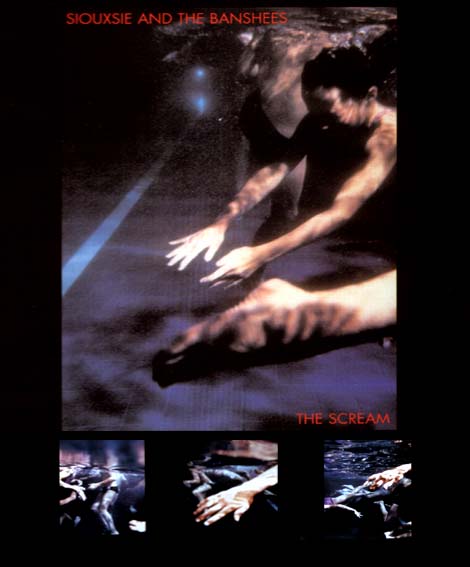 Digitally
remastered deluxe edition of the Banshees classic debut Digitally
remastered deluxe edition of the Banshees classic debut
Originally released in November 1978, The Scream defined post-punk; slightly too late and far too tuneful to fall into the original punk category, it bridged the gap between the fuck-you attitude of the Pistols and the more sophisticated sounds which were starting to emerge as the 80s approached. Listening to this re-mastered version, it's startling how close some of the songs come to Roxy and the new romanticism of Duran Duran - Switch even has a saxophone on it for chrissakes. Beautifully packaged and with an extra disc, this is a must have item for Siouxsie fans. The first two singles Hong Kong Garden and The Staircase (Mystery) omitted from the original album are here sounding cleaner than ever. Who else was using the glockenspiel in 1978? Plus two Peel sessions, live favourite Make Up To Break Up and five prototype versions of album tracks including Mirage a hypnotic pop tune with angular guitars and lyrics that may well to be to blame for all goth dancing since. "My limbs are like palm trees swaying in the breeze", indeed! A startling original album which sounds as ambitious now as it did 27 years ago. All the aggression of punk with a modernism and style completely of its own. Songs like Nicotine Stain or the superbly powerful Suburban Relapse could only be Siouxsie & The Banshees. 4/5 Suzy West |
||
| More press... |
||
| CD | |||
|
|
|||
|
|
|||
| UK CD | Track Listing | ||
|
|
|||
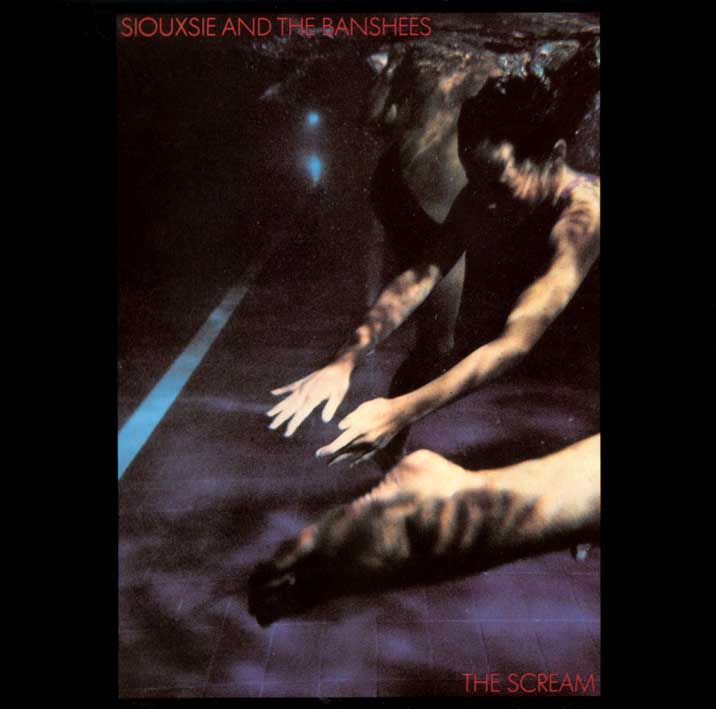 Cat: 839 008-2 Click on cover for full scan |
|||
| First Released On CD: | 28/03/89 | ||
| UK Chart: | N/A | ||
| US Chart: | N/A | ||
| Sleeve Design: | Paul Wakefield/ Banshees | ||
| Producer: | Steve Lillywhite | ||
| PRESS | ||
|
|
||
|
|
||
| Q 1989 | ||
|
|
||
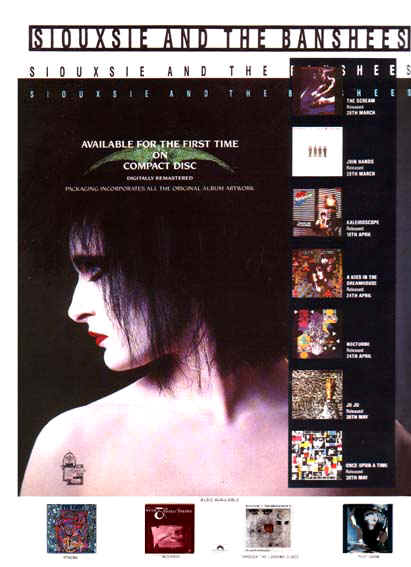 Chilling Chilling
From ice maiden to carnival queen - Siouxsie And The Banshees on CD. At the dawn of punk, Siouxsie Sioux was chiefly renowned for her dismissal of Bill Grundy as "a dirty old man" and for a dress sense designed to provoke an outbreak of British sexual hypocrisy. The Banshees may have made their debut at the 100 Club Punk Festival in 1976 but their extended assault on The Lord's Prayer was as much a dare as a stab at launching a career. Siouxsie's original invention was herself and that unflinching stare remains one of the great icons of punk's disdain. These beginnings render it all the more surprising that, 11 albums on, the Banshees have long transcended the first flush of punk to create an unmatched legacy of dramatic and very British pop. Polydor's release of the first seven Banshees titles on CD means that all their output is now available on compact disc bar the two "holiday projects", The Creatures and The Glove. If Siouxsie's reputation remains that of the haughty Queen of Gothic Punk, these CDs suggest that, within the parameters of their brooding and fantastical world view, there is a good deal more to Siouxsie and her long-term partner Steve Severin than that enduring image suggests. Although Siouxsie and Severin's punk credentials are impeccable, the Banshees were the last of the original punk clan to release a record. By the time Hong Kong Garden entered the Top Ten in August 1978, the Banshees had already seen their fair share of touring and rapidly progressed beyond the confrontational three-chord thrash that had rendered punk a musical cliché. Spearheaded by John McKay's sheet-metal guitar, their debut LP The Scream virtually invented the Gothic rock genre overnight and stands alongside Magazine's Real Life as a turning point in punk's movement away from rabble-rousing and into the internal landscape of the psyche. While songs like Carcass are dated by their goose-stepping beat and stone-faced delivery, the gut-wrenching Overground and the dizzy Jigsaw Feeling demonstrate that already the Banshees were far more concerned with psychodramas of disgust than confronting society head on. The Scream was a new take on suburban angst as Siouxsie's howling vocals intimated that the boredom and alienation of suburban life amounted to nothing less than a horror show. On later albums, the Banshees would uncover a rich exoticism in suburban fears; on The Scream, Steve Lillywhite's thundering production ensures that they sound trapped. Restored on CD to all its forbidding austerity, The Scream is both a declaration of intent and something of an artistic full stop. The following year's Join Hands indicates that while only PiL could match the Banshees' chilling wail of noise, they'd left themselves little room to manoeuvre. McKay's guitar still seesaws disturbingly and Severin's ear for compelling bass riffs is apparent on Placebo Effect, but while Siouxsie turns domestic claustrophobia into Gothic nightmare on Premature Burial and Mother, her vocals are oddly unwieldy. While Hong Kong Garden had displayed an ability to combine a playful sense of unease with driving pop melody, on Join Hands there are only riffs. The departure of McKay and drummer Kenny Morris a mere four days after its release suggests that the Banshees' two halves had indeed reached an impasse. The next album Kaleidoscope featured the now long-serving Budgie on drums and guitar work from John McGeoch and Steve Jones. The Banshees' embattled state obliged Sioux and Severin to rediscover their pop flair and the album's tow singles, Happy House and Christine, display a renewed ability to surround Siouxsie's icy mixture of fatalism and sarcasm in the kind of melodies that even a punk's parents might hum. The inventiveness of a piece like Red Light, driven along by the clicks of a camera shutter, proved that the Banshees were considerably more than a one-trick pony. 1981's Juju finds McGeoch firmly ensconced on guitar, Sioux and Severin devoting themselves to an exhaustive exploration of the power of idols and the Banshees reborn as a magisterial hard rock band. On moody songs like Arabian Knights, Siouxsie unveils a new sensuality while the Banshees display the brooding authority of the Stones circa Paint It Black. Juju confirmed the Banshees' staying power even if their frequent assaults on the singles chart has never own them a mass following like that of The Cure. Most early Banshee albums have their indigestible moments and the argument that they are the best singles band gains some credence from the Once Upon A Time collection where early singles like The Staircase gain contrast from later stabs like the eerie Israel. A sequel is now surely due. A Kiss In The Dreamhouse (1982) found the Banshees further investigating the kind of offbeat textures that Brian Jones brought to the Stones in the mid-'60s. Songs like She's A Carnival and Cascade make gorgeous use of strings while Siouxsie's voice acquires a hidden warmth for studies in erotic extremity like Melt! and Obsession. Dreamhouse probably remains the Banshees' finest hour. In 1983, the Banshees marked time with the live Nocturne, a well-recorded resumé of the band's capacity for Sturm und Drang lightened by the occasional exchange with the audience ("What time tunnel did you crawl out of?" Siouxsie asks one particularly nostalgic punk fan). McGeoch had flown the nest immediately after the Dreamhouse and Nocturne misses his magisterial authority despite Robert Smith's capable but understandably muted understudying. Smith soon departed in turn and the Banshees spent the mid '80s trying to capture their old fire. The Banshee's origins and Siouxsie's forbidding stare have made it hard for them to escape their punk associations while their use of horror imagery has occasionally blinded fans to the questions of power and threatened innocence their unsettling narratives explore. These CDs lend their work a fresh clarity and trace a remarkable evolution which serves as a reminder that, for its bravest exponents, punk was always more a question of daring than a set of conventions. The Scream 4/5 Mark Copper |
||
|
More press... |
||
| LP/CASSETTE | |||
|
|
|||
|
|
|||
| UK LP | Track Listing | ||
|
|
|||
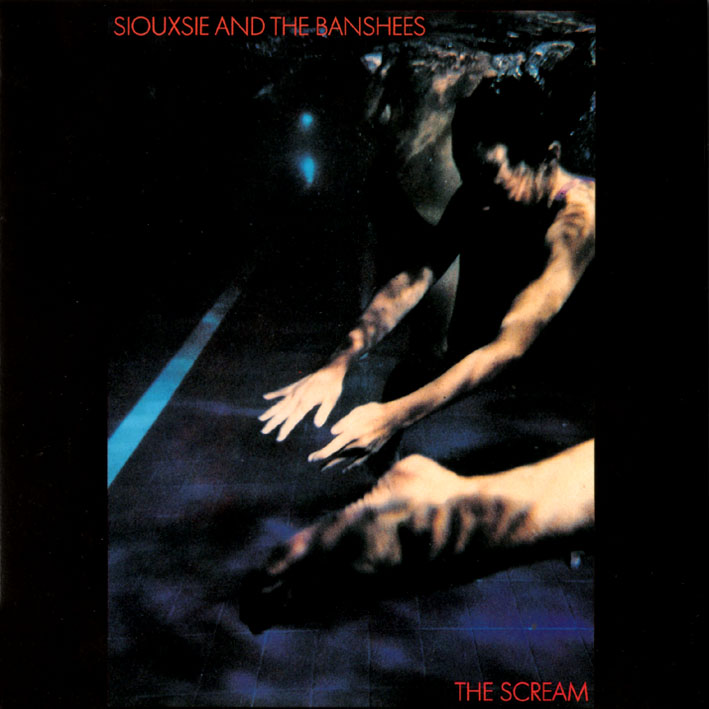 Cat: POLD 5009 Click on cover for full scan |
|||
| UK Cassette | Track Listing | ||
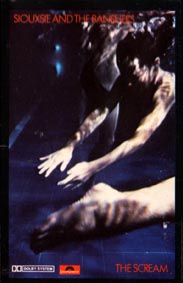
Cat: POLDC 5009 Click on cover for full scan |
|||
| Released: | 13/11/ 78 | ||
| UK Chart: | No.12 | ||
| US Chart: | Didn't Chart | ||
| Sleeve Design: | Paul Wakefield/ Banshees | ||
| Producer: | Steve Lillywhite | ||
| IMPORTS/PROMOS | |||
|
|
|||
|
|
|||
| US Import LP | Track Listing | ||
|
|
|||
 Cat: PD-1-6207 |
|||
| Japanese Import LP | Track Listing | ||
|
|
|||
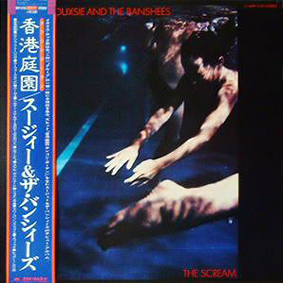 Cat: MPF 1210 |
|||
| PRESS | ||
|
|
||
|
|
||
| Unknown source 1978 | ||
|
|
||
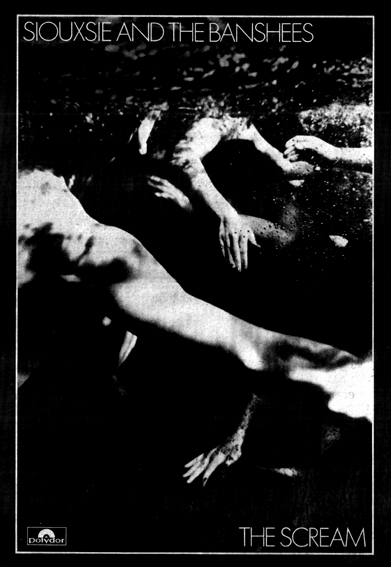 This
is a chilling, intense masterpiece. The Banshees have perfected a
group sound which is powerful but streamlined. On top of that
there's Siouxsie. Words and music combine to produce coolly dazzling
images. Bassist Steven Severin's lyrics to "Overground",
for example, precisely balance the careful and almost stately musical
arrangement "....live a life of pleasantries/mingle in the modern
families." On "Metal Postcard (Mittageisen)" the
Banshees achieve their most telling juxtaposition of sound and
vision. John McKay's abrasive guitar is well forward as Siouxsie's
voice swoops unnervingly, childlike but without joy. "Metal
will rule in my masterscheme". There's a strong sense of morbid
depression. "Nicotine Stain", "Carcass" and
"Suburban Relapse" are very different expressions of the same
disgust. In a media saturated environment everybody can use phrases
like "Suburban Relapse". The song is about a
breakdown. The deeper you go into "The Scream" the more
connections you find, like interlocking railway lines. The insights
are unsettling, given coherence by an ascetic attention to texture and
detail. It's OK R. D. Laing; you can stop make albums now. This
is a chilling, intense masterpiece. The Banshees have perfected a
group sound which is powerful but streamlined. On top of that
there's Siouxsie. Words and music combine to produce coolly dazzling
images. Bassist Steven Severin's lyrics to "Overground",
for example, precisely balance the careful and almost stately musical
arrangement "....live a life of pleasantries/mingle in the modern
families." On "Metal Postcard (Mittageisen)" the
Banshees achieve their most telling juxtaposition of sound and
vision. John McKay's abrasive guitar is well forward as Siouxsie's
voice swoops unnervingly, childlike but without joy. "Metal
will rule in my masterscheme". There's a strong sense of morbid
depression. "Nicotine Stain", "Carcass" and
"Suburban Relapse" are very different expressions of the same
disgust. In a media saturated environment everybody can use phrases
like "Suburban Relapse". The song is about a
breakdown. The deeper you go into "The Scream" the more
connections you find, like interlocking railway lines. The insights
are unsettling, given coherence by an ascetic attention to texture and
detail. It's OK R. D. Laing; you can stop make albums now.
|
||
|
More press... |
||
| CREDITS | ||
|
|
||
| Hong Kong Garden Lyrics | ||
|
|
||
|
Harmful
elements in the air Junk
floats on polluted water Hong Kong garden Tourists
swarm to see your face Slanted
eyes meet a new sunrise Hong Kong garden |
||
| Hong Kong Garden Credits | ||
|
Sioux -
Lyrics |
||
| Inspiration/Influence/Band Comment | ||
|
SIOUXSIE: "I’ll never forget, there was a Chinese
restaurant in Chislehurst called 'The Hong Kong Garden'. Me and my friend were really upset that we used to go there and like, occasionally when the skinheads would turn up it would really turn really ugly. These gits were just go in on mass and just terrorise these Chinese people who were working there. We’d try and say ‘Leave them alone’, you know. It was a kind of tribute."
Source: Punk Top Ten Interview 08/06/01. SIOUXSIE: "I remember wishing that I could be like Emma Peel from The Avengers and kick all the skinheads' heads in, because they used to mercilessly torment these people for being foreigners. It made me feel so helpless, hopeless and ill." Source: Uncut 01/05. SEVERIN: "That was freaky. A very strange period. We'd finished it a month before it came out, and we'd pushed it away - and it was just a very strange feeling having people rush up and say how great it was." Source: NME 23/12/78. |
||
|
|
||
| Pure | ||
|
|
||
| Instrumental | ||
| Pure Credits | ||
|
Sioux -
Voice |
||
| Inspiration/Influence/Band Comment | ||
| STEVE: "For 'Pure', you can also substitute 'essence'. That song wasn't written - it just happened." It happened during a sound check in France some time ago. "Also it summed up all that we were going through back in those days. It happened on stage and we just called it 'Pure'. That's like what happens when the band lets loose." Source: Melody Maker 21/10/78. | ||
|
|
||
| Jigsaw Feeling Lyrics | ||
|
|
||
|
Send me
forward, say my feelings |
||
| Jigsaw Feeling Credits | ||
|
Severin -
Lyrics |
||
| Inspiration/Influence/Band Comment | ||
|
SIOUXSIE: "It's the wrong things doing the right things for you. It started out as a self-disgust song and evolved from that. "
Source: Unknown 1978 . SIOUXSIE: It's when your limbs won't do what your brain wants them to. You're so confused that you can't co-ordinate your limbs to do something positive, and you just twist yourself in knots." Source: Melody Maker 21/10/78. |
||
|
|
||
| Overground Lyrics | ||
|
|
||
|
Got to
give up life in this netherworld |
||
| Overground Credits | ||
|
Severin -
Lyrics |
||
| Inspiration/Influence/Band Comment | ||
|
SEVERIN: "It was written at a time when we were all getting desperate for a contract... and it's really to do with why we wanted a major record deal."
Source: Record Mirror 09/12/78. SEVERIN: "it's another one about choice. You can either go along with the way things are or... It's very personal to the band on one level. The whole things about the uncompromising Banshees. It's saying that we can change to go overground but at the same time we know we'd be worse than ourselves." Source: Melody Maker 09/12/78. |
||
|
|
||
| Carcass Lyrics | ||
|
|
||
|
Someone's
in cold storage Be a
carcass be a dead pork |
||
| Carcass Credits | ||
|
Sioux -
Lyrics |
||
| Inspiration/Influence/Band Comment | ||
|
SIOUXSIE: "It's a love song really. You read about how love's supposed to be, but in the papers you see all these other things that people do to get their certain kicks. More people seem to have those sort of kicks than meeting the girl next door. It's an angle of looking at things and they are there - it's not purely fictional."
Source: Melody Maker 09/12/78. SIOUXSIE: "Yeah Carcass - it's about a butcher's assistant who can't get girls and so he falls in love with a lump of meat on the slab and so that he can be like the object of his affection - he cuts off his own arms and legs." Source: Zigzag 10/77. STEVE: "People always miss out on the humorous aspect of what we do, or rather the facetious aspect..." Source: Sounds 24/06/78. SIOUXSIE: "There's also 'My mother had her son for tea'. But when you think about it, every day can be really cruel yet so laughable." Source: Sounds 24/06/78. |
||
|
|
||
| Helter Skelter Lyrics | ||
|
|
||
|
When I get
to the bottom I go back to the top of the slide Do you,
don't you want me to love you So look
out! Will you,
won't you want me to make you When I get
to the bottom I go back to the top of the slide |
||
| Helter Skelter Credits | ||
|
Lennon/McCartney
- Lyrics |
||
| Inspiration/Influence/Band Comment | ||
|
SEVERIN: "It's more than a song now. We felt there was a need to re-do it after all that happened."
Source: Melody Maker 21/10/78. SIOUXSIE: "The Beatles had done it... quite innocently with just the intention of a helter skelter, a child's playground or other insinuations - like sexual ones." Source: Melody Maker 21/10/78. |
||
|
|
||
| Mirage Lyrics | ||
|
|
||
|
I'm just a
vision on your TV screen |
||
| Mirage Lyrics | ||
|
Severin -
Lyrics |
||
| Inspiration/Influence/Band Comment | ||
|
MORRIS: "It's more the idea of blindness and screens rather than taking it down to TV. It's about walls, screens, inhibitions, inabilities, expressing oneself in public."
Source: Melody Maker 21/10/78. SIOUXSIE: " 'Mirage' is about 'the image is no images, it's not what it seems' It's about people seeing us and taking what we do superficially." Source: Sounds 03/12/77. |
||
|
|
||
| Metal Postcard Lyrics | ||
|
|
||
|
Reunion
begins with a glass of mercury Metal is
tough, Metal will sheen |
||
| Metal Postcard Credits | ||
|
Sioux -
Lyrics |
||
| Inspiration/Influence/Band Comment | ||
|
Dedicated to the celebrated photomontage
artist of the Twenties/Thirties, John Heartfield, the original title for this
song was 'Letter To Heartfield'. The chorus is taken from one of Goerring's
speeches during the Second World War. SIOUXSIE: "It's a warning song. The whole propaganda of the Nazis at that time was very dangerous and it could easily creep its way in without there being all the hysteria of killing the Jews. Their whole propaganda could easily fit in today." How does she see this Metal Metropolis? "Not being able to get away from the commands of the day, not being able to escape, the idea of having cameras in your room and having people watching you..." Source: Melody Maker 21/10/78. SIOUXSIE: "What lies around the swastika I hate, but I also don't identify with blind patriotism either. I couldn't write a song based around Heartfield if I had that attitude." Source: Melody Maker 17/02/79. |
||
|
|
||
| Nicotine Stain Lyrics | ||
|
|
||
|
It's just
a habit |
||
| Nicotine Stain Credits | ||
|
Sioux -
Lyrics |
||
| Inspiration/Influence/Band Comment | ||
|
SIOUXSIE: "That song started off when I had both my hands full and I had a cigarette. I had to hold on to it and I could feel the fumes all around my face. I had to look in the mirror to see that my face hadn't gone brown. I just got to thinking how nicotine could soak up all your body."
Source: Melody Maker 21/10/78. KENNY: "It's about everyday things that you really don't need to do, that you don't want to do but you just find yourself doing them. Because you have to." Source: Melody Maker 21/10/78. SIOUXSIE: "It's that habits are very disgusting and you realise how addicted you are to them. You try to find the usefulness of your habits, you try to justify them." Source: Melody Maker 21/10/78. |
||
|
|
||
| Suburban Relapse Lyrics | ||
|
|
||
|
I'm sorry
that I hit you |
||
| Suburban Relapse Credits | ||
|
Sioux -
Lyrics |
||
| Inspiration/Influence/Band Comment | ||
| SIOUXSIE: "It's committing a crime under the stresses of everyday life. Being so confused and... I don't know how anyone can be a judge, an actual one in court". Source: Melody Maker 21/10/78. | ||
|
|
||
| Switch Lyrics | ||
|
|
||
|
Different
lives |
||
| Switch Credits | ||
|
Sioux -
Lyrics |
||
| Inspiration/Influence/Band Comment | ||
|
SIOUXSIE: ""I had in mind that it was going to be very fragmented with three different sections. That's all."
Source: Melody Maker 21/10/78. SEVERIN: "The scientist becomes the doctor and applies science to medicine - that kind of thing." Source: Melody Maker 21/10/78. SIOUXSIE: "The vicar becomes the scientist and he applies his religion to science and the doctor becomes the religious person and applies his medicine to religion." Source: Melody Maker 21/10/78. SEVERIN: "It all comes down to the same thing - the hypocrisy of it all." Source: Melody Maker 21/10/78. |
||
|
|
||
| The Staircase (Mystery) Lyrics | ||
|
|
||
|
Staircase
lying face up Slide down
the banister I was
standing on the landing Wont
someone assist me Muffled
footsteps on the carpet Which
floor which ceiling Staircase
lying face up |
||
| The Staircase (Mystery) Credits | ||
|
Sioux -
Lyrics |
||
| Inspiration/Influence/Band Comment | ||
|
SIOUXSIE: "There's something about a
staircase. It's so unpredictable and exciting at the same time. That feeling of
displacement, vertigo when you're at the top looking down or at the bottom
looking up." Source: Melody Maker 17/02/79. SIOUXSIE: "That's more a song about curiosity and fear, it's not a great political statement or anything." Source: Sounds 07/04/79. SIOUXSIE: "The song's just taking a very day-to-day thing, and the nature of that thing is very... mysterious." Source: NME 31/03/79. SIOUXSIE: "Yeah it's very much a memory of them. Especially in my house, people were always falling down the stairs in it." Source: Sounds 07/04/79. SEVERIN: "Sioux had written the lyrics and she knew what it was about but they had a different interpretation and they wanted a different sleeve. So me, Nils and Sioux wanted to go one way and they wanted the other... and that was the democracy of it." Source: Sounds 15/09/79. |
||
|
|
||
| Make Up To Break Up Lyrics | ||
|
|
||
|
Spots and
warts and blemishes Shadow
conjures cheekbone Girls with
eyes like swimming pools Now to
paint by numbers Make up to
break up Foundation
starts to tremble Make up to
break up |
||
| Make Up To Break Up Credits | ||
|
Sioux -
Lyrics |
||
| Inspiration/Influence/Band Comment | ||
| The lyric 'just like the devil's rain' is a reference to the film of the same name. "Devil's Rain was a cheapo cash in movie on the same lines as the Exorcist etc; an actress called Ida Lupino (beautiful name) was in it - Ernest Borgnine was the Devil - William Shatner the guy from Star Trek was the hero. The film was about this rain that melted people - their faces went like putty and if you squeezed their eyeballs all pus came oozing out." Source: Zigzag 10/77. | ||
|
|
||
| Love In A Void Lyrics | ||
|
Too many
fools blocking my motion Love in a
void Too many
bigots for my liking Love in a
void Jaded
reputation on which you're staking Love in a
void |
||
| Love In A Void Credits | ||
|
Severin -
Lyrics |
||